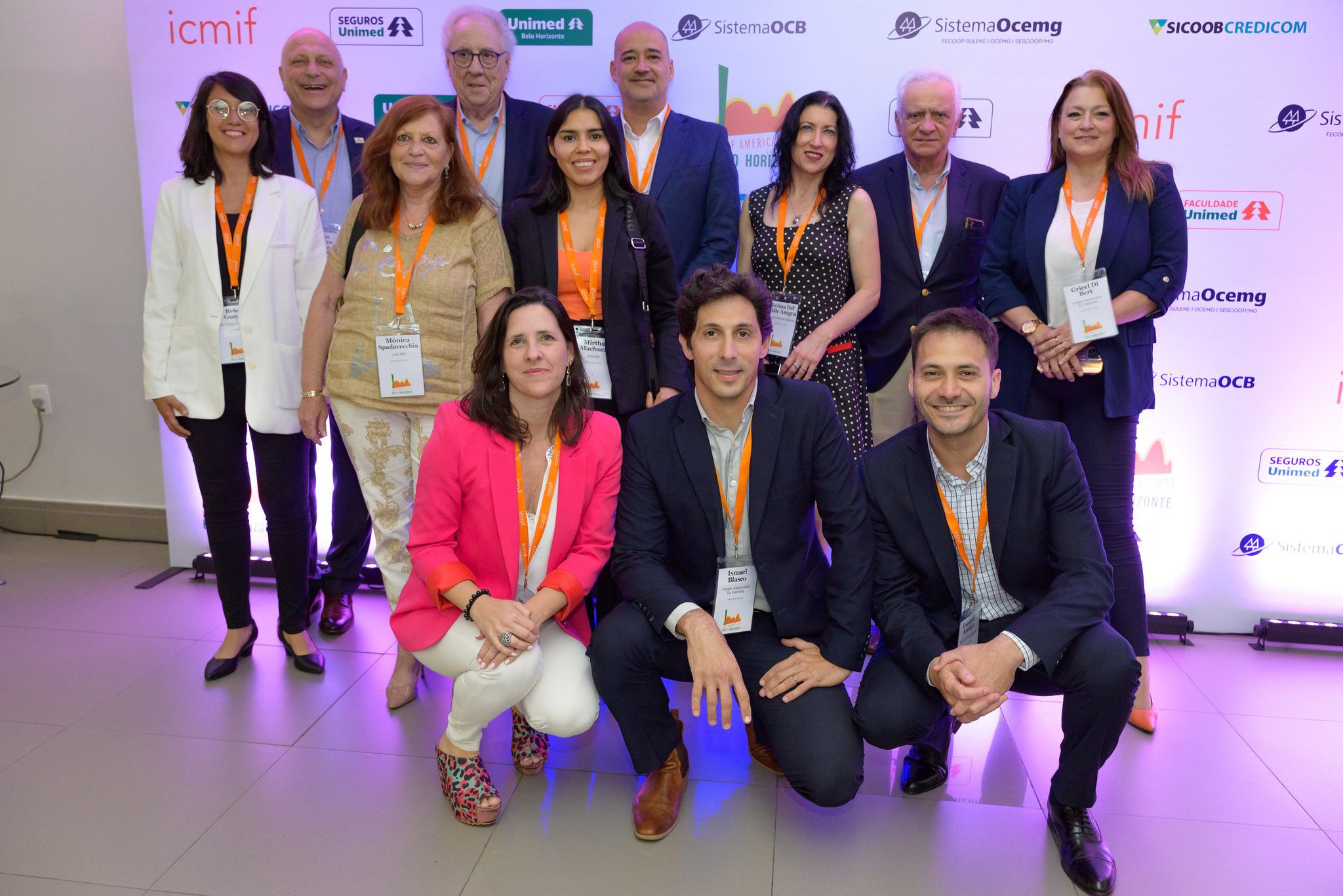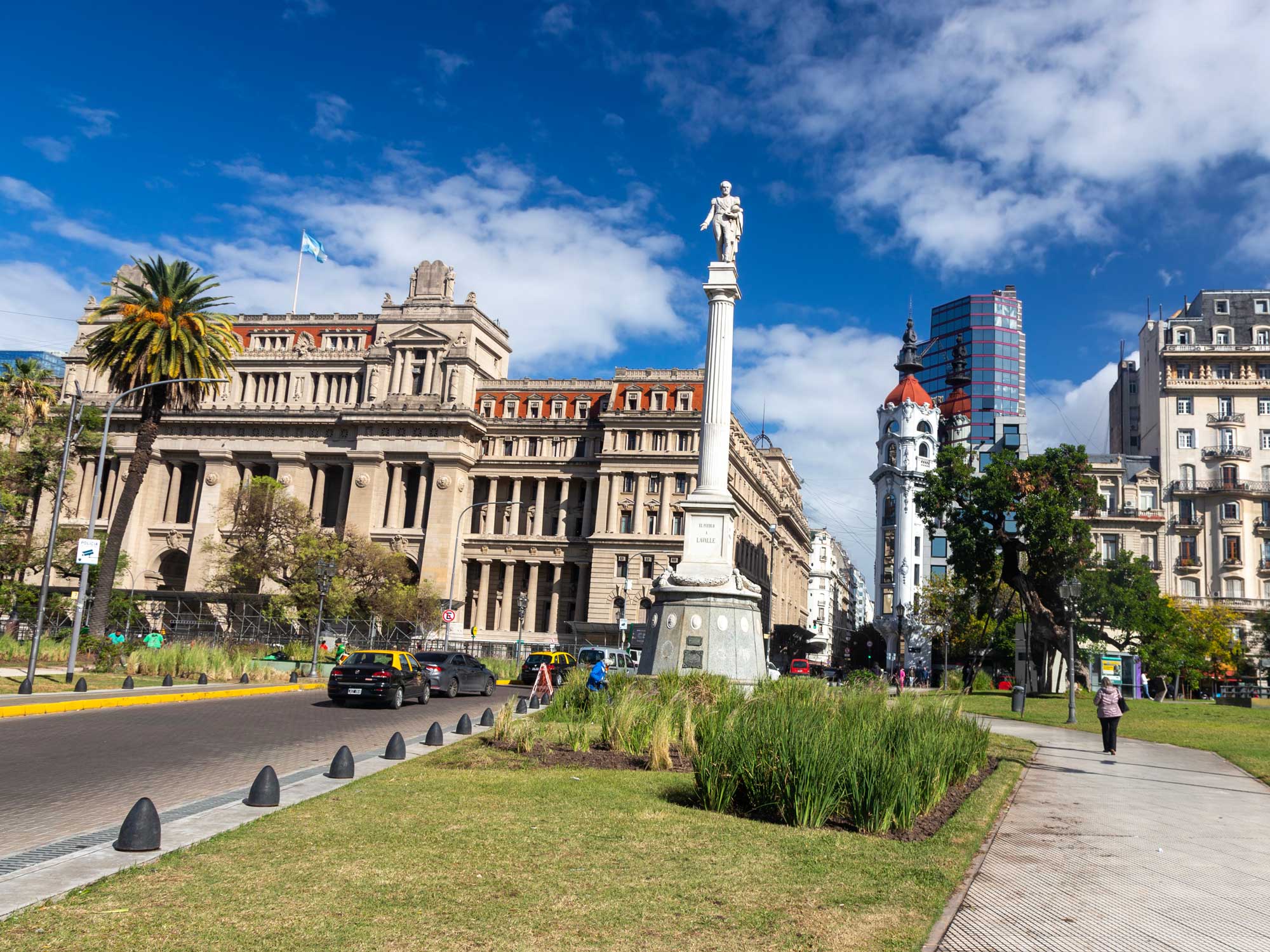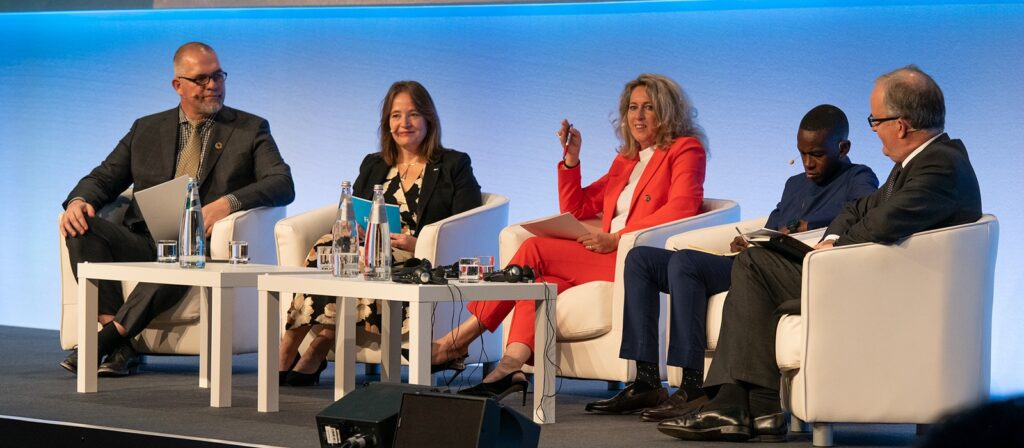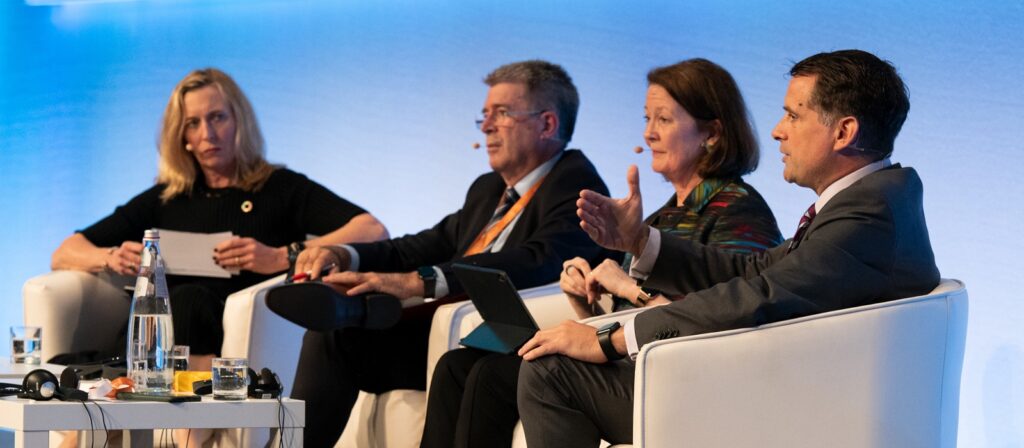In this CEO interview, Julián García, Executive Director, ADIRA, and Mónica Spadavecchia, General Manager, AACMS, the two co-hosts of the ICMIF Biennial Conference, which will take place in Argentina in November 2024, discuss the political and regulatory landscape in their country, the trends their members are seeing and the advantages of the mutual and cooperative model in Argentina. The hosts also share key topics they are hoping to see on the Conference agenda and some of their best recommendations for members travelling to the conference to enhance their visit.
The Argentine Association of Insurance Cooperatives and Mutuals (AACMS) and the Association of Insurers from the Interior of the Republic of Argentina (ADIRA) represent mutuals and insurance cooperatives throughout Argentina. Could you introduce your respective associations and share a brief description of the member companies you represent, your mission as an association, and some of the key services you provide?
Mónica: AACMS was founded in 1940. Since its inception, it has brought together the insurance cooperatives and mutuals of Argentina, serving to represent these entities before national, provincial, municipal, and international bodies. Today, we have 21 entities associated with AACMS. Our members are the fundamental pillar for the sustainability of the association, a common forum where issues related to the insurance activity in general and to cooperatives and mutuals specifically are debated and agreed upon. In the 1990s, AACMS ventured into the creation of various entities within the Association to respond to the reinsurance needs of its members, making these new entities active members. This has enabled them to build up capital and freely available reserves based on their percentage shareholding. Related to this, we cannot fail to mention the support we have had from ICMIF and its Reinsurance Committee, which paved the way for their placement abroad when we were faced with the need to cover large risks, The performance and growth of these joint ventures allowed for the creation of a national reinsurer, Argentine Reinsurers S.A. (RASA), which fills us with pride.
Julián: ADIRA is an association that unites the main insurers within the Republic of Argentina. It is comprised of 14 national capital companies, whose origins are linked to cooperativism and mutualism. They represent approximately 25% of the premiums issued in the Argentine market and more than 55% of agricultural insurance. We strive to create a space for meeting and association, considering the market needs and the specifics of each company that is a member of the association. We encourage public-private dialogue, convinced that such interaction is key to reaching consensus that will enhance the country's insurance activity. Working continuously on building an insurance culture is the vision of the companies that are part of ADIRA. We are aware that in these times, where everything is fast-paced and changes rapidly, having support to cover unforeseen events is fundamental. Having predictability makes a difference, and the role of insurance is to accompany this path. All services provided by ADIRA for its members aim to consolidate a predictable market, guaranteeing the rights of the insured and generating new opportunities for the development of the insurance market as a whole.
The political and economic landscape in Argentina has been very volatile in recent years. How has this affected the insurance industry, and given the new presidency, what are the prospects for insurers?
Julián: The insurance market has undergone a very tumultuous journey in recent years, affected by various factors that did not allow for normal functioning or for it to play its true role in society by contributing its full potential. To reverse this situation, first, macroeconomic factors must stabilise. We refer to inflation, fiscal balance, the stabilisation of the exchange rate, market deregulation, opening of international trade, among numerous and varied measures. These factors have distorted the normal course of the country's economic activity, from which the insurance market is not exempt.
The new management of the Superintendence of Insurance must demonstrate the value of its role in terms of its control and guidance of the insurance market, being of utmost importance that the new authorities can highlight the industry's needs with all the decision-making bodies of the state and the business community. And also, fundamentally with the Judiciary, in order to work together to, amongst other issues, achieve a reduction in the high rate of legislation and the existence of rulings that are not rational.
Mónica: The last two years have been marked by a deep recession. The COVID-19 pandemic further accelerated the economic downturn. The fiscal deficit and the continuous monetary issuance to finance this deficit further accentuated inflation, which is why the economy continues to experience macroeconomic imbalances, limiting growth. Argentina has natural and human resources as well as very important reserves such as gas and lithium, but investments should be increased to further exploit its resources. Regarding the insurance industry in particular, there are structural factors that affect the sector, such as investment policies in state securities, the increase in prices which, in contrast with the risks covered, exceed the contracted premiums, highlighting the risks to which our sector is exposed.
How has the regulatory landscape evolved given the economic and political uncertainty, and is there any regulatory challenge that specifically affects mutuals/cooperatives (now or in the near future)? Are your organisations doing anything, working with your members, to help exert pressure or advocate for any regulatory or legislative change that supports the mutual/cooperative model?
Mónica: The insurance market, as a sector of the economy, is immersed in total uncertainty, and the high inflation rates greatly impact the economies of insurers. The macroeconomic situation our country is suffering drastically affects the patrimonial and financial situation of the sector's entities.
It is imperative to have profitable financial instruments, to have access to the capital market to meet commitments with foreign reinsurers, to lower the tax burden and to reduce excessive litigation, since today we have judgments that exceed the maximum insured amount, causing negative effects on the results of the balance sheets. In the face of this crisis, the mutual/cooperative sector, as a solidarity and inclusive group, will establish joint policies to strengthen the insurance market and, beyond the adversities, achieve continuity and stability to meet the commitments taken on with policyholders.
Julián: There are several important issues affecting our industry, many of which are the result of distortions in macroeconomic parameters, such as high inflation, difficulties in accessing the capital market in hard currency, court rulings that are almost impossible to comply with, national and provincial tax pressure that affect the premium benchmark prices.
We believe that as macroeconomic problems are resolved and addressed, it will be possible to operate in a more normal market, where the functioning of regulations and control functions of the Superintendency frame the market within the parameters of solvency and financial liability that allow for a healthier market. The mutual/cooperative model has a solid foundation and deep roots in the business community, particularly in the interior of the country. The cooperative and mutual structure represents approximately 23% of the total turnover of the insurance market.
What are the current trends facing your members? What are your members doing to mitigate any potential challenges or risks and also to seize new business opportunities?
Julián: It is essential to rethink investment options and generate new alternatives so that companies and the sector in general can deploy their full potential. There have been several periods of negative financial results that directly affect the equity of insurers and limit the opportunity to generate new investment opportunities through which the profits of the insurance sector can finance other productive sectors. Therefore, we need a range of financial instruments in the real economy, allowing this sector to expand into productive investments with the multiplier effect this represents on the country's economy. Resolving the difficulty of accessing the necessary foreign currency for payments to international reinsurers is of paramount importance.
Mónica: Beyond the deep crisis that Argentina is going through, our members have the capacity for resilience and are managing to adapt to economic, cultural, and technological changes. In a world moving towards digitalisation, the insurance market is undergoing an unprecedented technological transformation. The development of new coverages and structures is fundamental. The digital era and the development of new technologies are providing them with endless opportunities as well as a great challenge.
What advantages do mutual/cooperative insurance companies offer compared to other insurance companies in Argentina?
Mónica: The first manifestation of cooperativism in Argentina dates back to 1898, primarily initiated by a group of French immigrants who, to cover hail risks, founded El Progreso Agrícola de Pigüé in the south of Buenos Aires Province. This entity has honoured us with its membership since the beginnings of AACMS. They contributed not only work techniques and procedures but also traditions and mutual forms of organization, fostering solidarity, cooperation, and mutual aid through institutions that were grouped by nationality, community, profession, or activity.
Julián: In the Argentine insurance market, there are many diverse companies, structured under different legal business models. Mutuals and cooperatives represent a significant portion of the insurance activity, and were pioneers in providing such services, especially in the communities in the interior of the country, covering needs not met by commercial companies due to their low or zero profitability. It was there that the cooperative spirit and mutual aid for things like health, economic assistance, logistics and communication services, and of course insurance stood out as a major player that provided reassurance and security to all those communities. Over time, and thanks to the spirit and concept of cooperation, the cooperative insurance activity was able to develop and grow steadily and sustainably, becoming a fundamental actor in the insurance market, competing on an equal footing and even surpassing in many areas, the other forms of insurance.

We are very pleased that the ICMIF Biennial Conference 2024 will be held in Buenos Aires in November this year, jointly organized by AACMS and ADIRA. What topics would you like to see on the agenda? What areas do you think Argentine insurers can learn from the global mutualist/cooperative community? Likewise, what lessons on best practices can mutual/cooperative insurance companies from around the world learn by listening to the perspective of Argentine members?
Julián: For ADIRA, it is a source of great pride to be co-hosting the ICMIF Biennial Conference, but more importantly it is a big responsibility as we will have the opportunity to share important topics with the leaders of cooperative and mutual insurers from around the world who will be in Argentina this year. The Conference theme " Collaborating with purpose" reflects the spirit of this meeting in which topics ranging from sustainability and international agreements on environmental care, to new strategies and advances in cybersecurity, and the benefits of the cooperative/mutual business model will be discussed. Also, regarding human resources issues, there will be discussions on the search for equal opportunities and better integration in work teams.
Among all the activities that are being discussed and planned, ICMIF members' focus on the global strategic issues agenda that will inspire and help their leaders to adapt and transform their businesses for a resilient and purpose-led future will not be lost. Within the plans for the Conference, there will also be a space dedicated to developing the younger generation of the insurance sector. The fourth ICMIF Young Leaders programme will take place in November, during the Conference, which will be designed to train the next generation of insurance leaders, with the intention of inspiring them with the cooperative and mutual spirit.
Mónica: For AACMS, it is an honour and a great commitment to be, along with ADIRA, the hosts of the ICMIF Biennial conference 2024 to be held in Buenos Aires next November. It will be very important to be able to exchange knowledge and experiences through the topics to be developed at the conference. Issues such as climate change, which is one of the concerns in the global insurance industry in the face of potential catastrophic events, , artificial intelligence, and regulation will be addressed. These conferences are extremely positive, generating synergy that helps companies understand and mitigate risks. Also highly significant is the participation of groups of young leaders, from where human talents emerge under the principles of cooperativism and mutual aid, values that are extremely indispensable for the global insurance market.

Lastly, for those attending the ICMIF Conference and perhaps staying in Argentina after the event, what would you most recommend they explore in your country?
Mónica: To all those who attend and have the opportunity to stay a few more days after the conference, we suggest taking a tour of Buenos Aires. In its centre, you will find the Plaza de Mayo, the Plaza de los dos Congresos, and the Teatro Colón, a luxurious opera house built in 1908 with 19th-century European architectural influences. You can also visit its famous neighbourhoods like La Boca, San Telmo (with Tango shows), Recoleta, Puerto Madero, and Palermo. You will find museums, literary bars, galleries, and restaurants that combine local flavours with international ones. Buenos Aires is a vibrant city, both day and night, as varied as it is intense.
Tours offer everything from trekking in the Andes Mountains, whale watching in the Beagle Channel, climbing the astounding Aconcagua - the highest point in Argentina at nearly 7,000 meters - to exploring Patagonia in the South of Argentina, famous for its magnificent mountains. The imposing Iguazú Falls in the province of Misiones is an incredible natural wonder composed of a chain of waterfalls three kilometres long. The Perito Moreno Glacier in Patagonia with a length of 30 kilometres, is one of the largest freshwater reserves in the world.
Julián: After attending the Conference in Argentina, the delegates have the opportunity to explore a wide range of destinations that highlight the best of our country. From the wonderful city of Buenos Aires, to the stunning natural beauty of Patagonia, with its imposing glaciers and mountainous landscapes. In Argentina, people will surely find a special place for match your tastes. Those looking to immerse themselves in the rich Argentine culture can visit the city of Salta, known for its colonial architecture and folk festivals, while wine lovers can enjoy tastings at the wineries in Mendoza, famous for their exquisite varieties and the birthplace of the world's best Malbec.
Argentina, is a land that has always opened its arms in welcome to everyone. It grew from its Spanish colonial past to become the destination of millions of immigrants who came to this country from the late 19th century and much of the 20th century, generating a culture of universal openness accommodating all races, religions, and beliefs. From this culture the mutual and cooperative spirit was born, which is continues until today. Explore our Argentina...... It will be worth your while! Welcome.....!!!
AACMS and ADIRA are co-hosting the ICMIF Biennial Conference 2024 which will take place in Buenos Aires, Argentina from November 12-15. The theme for this year’s Conference is Collaborating with purpose which will address the priority strategic issues around people, performance and partnerships to inspire and assist leaders to transform their businesses and promote effective collaboration for a resilient, purpose-led future.
The ICMIF Biennial Conference is the premier global gathering of mutual and cooperative insurance leaders from across the world. A conference with a difference, the event is designed to stimulate original ideas for better business performance and strategic advantage: helping leaders create real, lasting value for their organisations, their member-policyholders, and the communities they serve.






